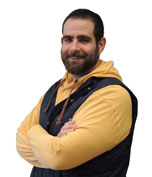Project Description
Home / Members / Graduate Students / Michael Korngut
MICHAEL KORNGUT
Doctoral Student;
Department of Philosophy, Western University
Mike Korngut is a Brooklyn, NY native and proud product of the City University of New York (CUNY) system. After graduating from Brooklyn College with degrees in both Philosophy and Classics, he was a member of Western Ontario’s inaugural Masters in Ancient Philosophy cohort, and is currently a doctoral student housed in the Philosophy department at Western. While Mike’s research, which focuses on the body and the concept of health in Plato, is first and foremost philosophical, he values maintaining an active affiliation with Classics also, believing that the most robust academic approach to Plato’s philosophical corpus is one which incorporates the literature’s historical and cultural contexts.
Scholars have long ago concluded that Plato’s theories of moral psychology and epistemology utterly condemn the human body. After all, the body for Plato is the definitive impediment, omnipresent and unconquerable, which hinders even the wisest of men from attaining perfect knowledge. Additionally, as it relates to Plato’s ethics, the body seems, quite conclusively, to be the single greatest cause of vicious and immoral behavior. Yet the question my research aims to answer is this: Can we, at any point in Plato’s philosophical works, locate some positive and valuable role that the body plays?
It is in his dialogue called the Phaedo that Plato most vigorously articulates a condemnation of the body. For we see, in this work, his trademark dualism, i.e. his posit that the soul and body are distinct and separable, on full display. And with this display comes the assertion that throughout the course of one’s life, their body functions as a sort of prison for the soul; a decaying, temporary casing for the immaterial, ever-lasting and divine. The body is the source of carnal desires and base urges, irrational and powerful, the satiation of which pollutes and obfuscates the soul from its very nature. We see prescribed a zealous eschewing of all, except for the most basic, regard for one’s body as the imperfect means to combat its contagion-like qualities. Yet my research intends to show that beyond this characterization of the body in the Phaedo, there is also, within Plato’s works, a qualifiedly redeeming tolerance for the body, so much so that we might even be able to locate traces of a positive value for it.
In addition to my research in Ancient Philosophy, I am fascinated by the epistemic and existential attitudes we witness, display, and engage with daily on social media. I believe Philosophy as a discipline is uniquely equipped to examine such attitudes, though we have, largely, left this newly emergent task to Sociology, Anthropology, Psychology and Media Studies. My research aims to analyze the post-truth manner in which so many of us, our friends, and our families consume and produce content on mediums like Facebook and Instagram.
I am also in the process of completing an illustrated manuscript and multi-media project tentatively titled Why Ladies’ Screams Keep Creepin’ in Shady’s Dreams. Using the psychoanalytic frameworks Freud and Jung developed to analyze mythic structure and meaning, and Joseph Campbell’s seminal work on the elements of the ‘monomyth’, this project presents the life and corpus of Marshall Mathers (Eminem) as a modern mythic tale; a ‘hero’s journey’ cast in concrete and curse words, set to an ill beat.
Research Assistant:
Klima, Gyula (ed.) 2017. Questions on the Soul by John Buridan and Others: A Companion to John Buridan’s Philosophy of Mind. Cham, Switzerland: Springer International Publishing.
Conference Presentations and Invited Talks:
“Plato’s Pains of Self-Ignorance.” Canadian Philosophical Association Annual Congress (Peer Reviewed). Ryerson University. May. 2017
“Big Ideas in Plato’s Symposium.” Classical Association of Canada Annual Meeting (Peer Reviewed). Memorial University of Newfoundland and Labrador. May. 2017
“Self-help Gurus in the Post-truth and ‘Pre-truth’ Eras.” What is Life? Conference-Experience (Peer Reviewed). University of Oregon. April. 2017
“An Imperfect Case.” Classical Association of Canada Annual Meeting (Peer Reviewed). Université Laval. May. 2016
“Protagoras and Aristotle on Grammatical Gender.” Upper Canada Society for Ancient and Medieval Philosophy. University of Western Ontario. January. 2016
“Mimesis in the Philebus.” Ancient Philosophy Graduate Symposium. University of Western Ontario. October. 2014
“How Ethical Can an Ancient Skeptic Be?: A Response to Richard Bett.” PGSA Colloquium Series. University of Western Ontario. October. 2014
Teaching Assistantships:
CS 2200 Greek and Roman Mythology. University of Western Ontario. 2016-17
PHIL 2074F Business Ethics. Huron University College. 2016
PHIL 2065F/G Philosophy of Evil. University of Western Ontario. 2015-16
CS 2300 Sport and Recreation in the Ancient World. University of Western Ontario. 2014-15
CS 2908B Egyptian Art and Architecture. University of Western Ontario. 2014
CS 2810A Ancient Greece in Film. University of Western Ontario. 2013

